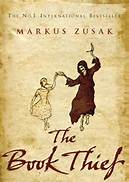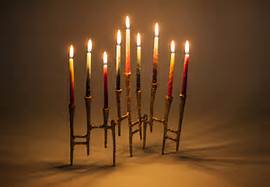 Set in Germany in the years 1939-1943. The story of Liesel Meminger (actress Sophie Nelisse), narrated by Death who has in his possession the book she wrote about these years. The country is holding its breath. Death has never been busier, and will become busier still!
Set in Germany in the years 1939-1943. The story of Liesel Meminger (actress Sophie Nelisse), narrated by Death who has in his possession the book she wrote about these years. The country is holding its breath. Death has never been busier, and will become busier still!
Liesel’s foster parents (actor Geoffrey Rush and Emily Watson) are living outside of Munich, who scratch out a meager existence for themselves, Liesel and the Jewish man hidden in their basement.
I cannot help but see the movie in two ways: the story itself, and how it’s shown. They are not quite inseparable, but they definitely support each other.The story is lyrical, haunting, poetic, profound. Death is rendered vividly, a lonely, haunted being who is drawn to children, who has had a lot of time to contemplate human nature and wonder at it. Liesel is very real, a child living a child’s life of soccer in the street, stolen pleasures, sudden passions and a full heart while around her bombs drop.
“So many humans. So many colours. They keep triggering inside me. They harass my memory. I see them tall in their heaps, all mounted on top of each other. There is air like plastic, a horizon like setting glue. There are skies manufactured by people, punctured and leaking, and there are soft, coal-coloured clouds, beating, like black hearts. And then. There is death. Making his way through all of it. On the surface: unflappable, unwavering. Below: unnerved, untied, and undone.” (p.331 from the book “Book Thief” by Markus Zusak).
So, in a way, Death and Liesel are both book thieves: Liesel steals randomly at first, and later more methodically, but she’s never greedy. She shares her stolen books with her neighbours during bombing raids as well as with the Jewish man hidden in the basement. 
Death pockets Liesel’s notebook after she leaves it, forgotten in her grief, amongst the destruction that was once her street, her home, and carries it with him.
“People and Jews and clouds all stopped. They watched. As he stood, Max looked first at the girl and then stared directly into the sky who was wide and blue and magnificent. There were heavy beams – planks of sun – falling randomly, wonderfully, onto the road. Clouds arched their backs to look behind as they started again to move on. “It’s such a beautiful day,” he said, and his voice was in many pieces. A great day to die. A great day to die, like this.” (p.p.543-4)
I don’t agree with Death portraying the thought “Don’t be afraid of death. Don’t be panic-all are mortal and so on”. Death must be natural as birth, then it comes easily without fear. Violent death is unnatural and is disgusting. Nobody has the right to deprive a person from this gift.
At the end of the movie there is also one not acute fact: not only Americans came to liberate Germany from Nazis, among brave soldiers were: Russians, Canadians, British, Jewish, German and other people of many nationalities. Holocaust to be remembered by all. Crystal Night never to be repeated!
Listen to: Andre Rieu – Romantic Italian Music